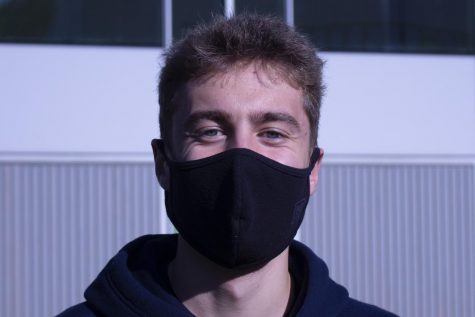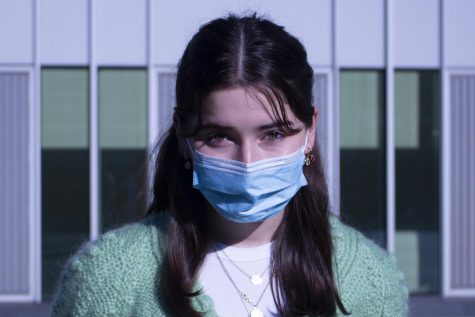Biden and Trump spar one last time
After the first presidential debate between President Donald Trump and Democratic nominee Joe Biden, many were left wondering if it would be the last showing between the two candidates. With interruptions stifling discussion of policy proposals, Biden, but more so Trump, seemed ill-inclined to engage in the substantive debate over what his second term will entail.
The next debate was then proposed to be conducted virtually to accommodate Trump’s COVID-19 diagnosis, however, Trump refused to participate as a result.
Nonetheless, the second and final presidential debate went ahead as scheduled Oct. 23. Owing to interruptions noted above, each candidate had their microphones muted while the other answered questions. At the request of the Biden campaign, a sheet of plexi-glass was installed between the podiums to protect the two presidential hopefuls from potential exposure to COVID-19.
With the new setup, the debate couldn’t have been more different from the first outing between Trump and Biden. Though there was a fair number of personal attacks that are all-too present in 2020 politics, both candidates were largely focused on policy and conducted themselves as such.
Though he established low expectations for himself in the first debate, Trump nonetheless appeared much more restrained and prepared on stage. His answers to questions were coherent and logical, as were his jabs at his opponent.
Though there was a fair number of personal attacks that are all-too present in 2020 politics, both candidates were largely focused on policy and conducted themselves as such.
At one point, Trump, appearing to begin an attack line against Hunter Biden’s military record, then pulled himself back from finishing the comment. However, he still repeated unproven claims, beyond those made by Russian disinformation networks, that Hunter had taken millions of dollars from the mayor of Moscow.
Beyond that, though, he put Biden on the defensive at times, forcing him to admit that he wouldn’t outlaw fracking, a controversial process of extracting oil, if elected. Fracking is of key political importance in this election, and has forced the Democratic nominee to walk a very fine line. On one side, he has to consider the electoral significance of the issue – the industry employs 25,000 people in the key battleground state of Pennsylvania. His promise to allow fracking to continue under a Biden presidency will serve to shore up support among those voters.
However, young progressives in his party could potentially give the former Vice President problems. He was repeatedly targeted in the primary for his position on the issue, which is far more cozy to the oil and gas industry than many in his party would like.
Nevertheless, Biden otherwise looked calm and collected, with few gaffes that inherently come with the 77-year-old. The age old question though is whether this debate, like most in recent memory, actually persuaded anyone to change their vote. At this point, no polling data indicated that this was the case, but anyone tuned into politics understands that Trump is seemingly immune to bad data.
In just a week, we’ll see if Trump will again stump every statistician in America, or if his 2016 victory was indeed a stroke of luck.
SARS brutality and Boko Haram destabilize Nigeria
Nigeria has now seen weeks of protests against police brutality. Ironically, law enforcement has been fatally brutal towards the protesters themselves. According to euronews, 12 people were killed and 28 more were injured after security forces fired into a crowd of protesters in Lagos, Nigeria’s capital.
The Special Armed Robbery Squad was created in 1992 to combat widespread armed robbery in the nation. Since its creation, however, the force has been plagued by corruption and misconduct.
Their brutal conduct has resulted in widespread outrage, with the hashtag #EndSARS rapidly gaining popularity online, supporting Nigerian voices to be supported by the international community on social media. Foreign governments are taking notice as well.
If the government fails to rein in SARS, and is equally unsuccessful in defeating Boko Haram, its legitimacy will further be called into question, and the power of each group will rise.
The scars of military rule in Nigeria are still fresh, and those protesting are just old enough to remember what it was like in the late ’90s. There is growing concern that the rise in brutality could precede Nigeria’s collapse into a similar system.
Nigeria’s fraught political history offers an example of the splintered, tyrannical country it could become if SARS is given unrestricted power, as it currently holds. Since the drafting of its new constitution, the country has only conducted three semi-legitimate presidential elections, and over the last four years democratic institutions have been chipped away at.
Threats from radical islamist group Boko Harram have steadily amassed power in the country, occupying large swaths of land in the northern part of the country. Thousands have since been killed in their wake, and many more have faced the harsh rath of their rule as they have sought to establish a caliphate akin to that which existed in Syria just a few years prior. The threat has grown to the point that French special forces have been tasked with combating the group.
Though the two issues are at face value unrelated, they are both indicative of a country that is increasingly decentralized politically, with small, militia-like groups vying for power within Nigeria. If the government fails to rein in SARS, and is equally unsuccessful in defeating Boko Haram, its legitimacy will further be called into question, and the power of each group will rise.
SARS and Boko Haram pose major threats to Nigeria. It’s up to the government, already struggling to manage COVID-19 and the subsequent economic downturn, to take on yet another challenge. Should it fail to do so, it risks tearing the country apart.
France grapples with Islamic Extremism
Losing the fight against a surging COVID-19, the last thing French President Emmanuel Macron needs on his hands is a national battle with Islamic extremism. Blindsided by a fatal terrorist attack in a Parisian suburb Oct. 16, that’s exactly what he got. The murder, along with subsequent action taken by the French government, reminds the world that France remains the geographical epicenter of the fight against radical Islam.
The victim, 47-year-old schoolteacher Samuel Paty, had used caricatures of the prophet Muhammad in class to teach freedom of speech, angering Muslim pupils. In response, a parent shared this information online, and an 18-year-old Chechen man, with no prior connection to the school, sought out the teacher and killed him 10 days later.
If France counters extremism too aggressively, they allow the Islamophobic ideologies of the far-right to gain traction. And if they go about it indiscriminately, they risk being labeled Islamophobic themselves.
France was in a state of immediate shock following Paty’s death, but grieving has quickly given way to anger. Amid vigils, the attack has strengthened motivation to destroy Islamic extremism.
Over the past decade, European leaders have found themselves between a rock and a hard place when fighting radical Islam. If they counter extremism too aggressively, they allow the Islamophobic ideologies of the far-right to gain traction. And if they go about it indiscriminately, they risk being labeled Islamophobic themselves. Yet, if they act too softly, they open the door for extremists to capitalize.
However, it seems Macron doesn’t have to navigate that conundrum this time; the choice is far more straightforward. The French public is so outraged over the grotesque killing that they have forced him into action. He obliged, and French authorities swiftly took action to bring conspirators of the crime into custody.
Further, Macron’s government has attacked the bigger picture threat, closing a mosque on the outskirts of Paris and asking Russian President Vladimir Putin to join forces in the fight against terrorism. To maintain popularity, Macron feels he must unapologetically stamp down on Islamic extremism.
Such as France finds its way into global news for terrorism, it is similarly a hotbed of Islamophobia. According to France 24, two Muslim women were stabbed under the Eiffel Tower in the wake of the Paty attack. The attackers reportedly flung racist insults at the women, calling them “dirty Arabs” and telling them, “This is not your home.” Various Muslim organizations in France have complained of heightened Islamophobia.
Unsurprisingly, Macron’s clout is at stake. He has utilized Paty – and his death – to rally national support for what he considers the “rebirth of the Republic.” Macron faces re-election in 2022, and ultra-nationalist leader of the Rassemblement National (National Rally) Party Marine Le Pen will likely be his primary opposition. As fear of terrorism grows, Le Pen’s hardline stance may seem more attractive to voters. In a nation struggling with Islam’s role in society, what standing does Macron have if Le Pen can parade this attack in front of him?
Though Macron is in a tricky situation, he can still strengthen public faith in his leadership. The frenzy France finds itself in leaves a political upper hand out in the open, ready for the taking. Should his fight with extremism be successful, Macron could compensate for his bungling of COVID-19.











Peggy Elhadj • Oct 27, 2020 at 6:39 pm
Fabulous article Cameron and Sal!!